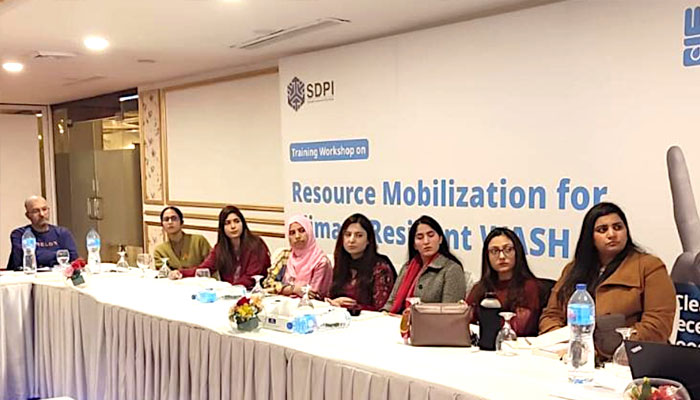Experts for aligning climate-friendly tools with SDGs for economic uplift
LAHORE: Experts stressed the need of aligning climate-resilient Water Sanitation and Hygiene (WASH) interventions with the Sustainable Development Goals (SDGs) to achieve sustainable development and economic prosperity of the country.
Speaking at a moot organised by WaterAid in collaboration with the Sustainable Development Policy Institute (SDPI), the experts said the effort would pave the way to join the league of upper-middle-income countries by 2030.
The experts said this national commitment highlights the importance of aligning policy frameworks, investments, and initiatives with the SDGs to drive progress across all sectors, including Water, Sanitation, and Hygiene (WASH).
Dr Shakeel Hayat, senior advisor at Climate Change and WASH, WaterAid Dr Shakeel Hayat, underscored the importance of access to WASH for health and sustainable development, especially in regions vulnerable to climate change, pandemics, and conflicts.
“Millions of people lack access to safe water, sanitation, and hygiene facilities, leading to significant health and economic challenges,” he maintained. He said WASH is a critical element of humanitarian discourse in the context of Pakistan’s vulnerability to climatic hazards, which both exacerbate humanitarian emergencies and hinder development progress. This calls for the need to ‘build back better’ in anticipation of extreme weather events leading to droughts, heat waves, floods, and urban flash floods.
M Awais Umar, lead author of the Policy Brief, highlighted the importance of the WASH in terms of health, education, gender equality, and climate action in Pakistan. The brief highlights the need for investments in climate-resilient WASH infrastructure, public-private partnerships, and gender-sensitive services to improve health outcomes and foster economic growth, ultimately aiming to align national policies with global sustainable development objectives.
M Sufyan, Punjab and KP manager of WaterAid said the pathway to achieving sustainable development lies in integrating climate resilience into WASH systems. Bushra Khaliq from Women in Struggle for Empowerment said safe drinking water has become a class question in the country, whereas depleting groundwater and pollution was increasing that forced women to travel to far-flung areas for accessing clean drinking water.
Shahnawaz Khan from Strengthening Participatory Organization (SPO) said local government was responsible for ensuring WASH facilities but the province of Punjab lacked any local government for past many years.
Dr Uzma Ashiq, in charge Gender and Development Studies Department, Lahore College Women University, said the varsity had started various activities with Water Aid and every student was bound to implement community work.
“Our student won UNESCO Award on water and sanitation to save water in different household activities. Such university students can be utilized as ambassadors of WASH in their regions,” she added.
Punjab Aab-e-Pak Authority officials also apprised the participants that carbon credit guidelines were being developed by the Authority along with green credits that were being introduced in the province that also emerged as a critical opportunity for all stakeholders to develop synergies on the issue with respect to WASH targets.
-
 Cuba-Canada Travel Advisory Raises Concerns As Visitor Numbers Decline
Cuba-Canada Travel Advisory Raises Concerns As Visitor Numbers Decline -
 Anthropic Buys 'Super Bowl' Ads To Slam OpenAI’s ChatGPT Ad Strategy
Anthropic Buys 'Super Bowl' Ads To Slam OpenAI’s ChatGPT Ad Strategy -
 Prevent Cancer With These Simple Lifestyle Changes
Prevent Cancer With These Simple Lifestyle Changes -
 Air Canada Flight Diverted St John's With 368 Passengers After Onboard Incident
Air Canada Flight Diverted St John's With 368 Passengers After Onboard Incident -
 Experts Reveal Keto Diet As Key To Treating Depression
Experts Reveal Keto Diet As Key To Treating Depression -
 Inter Miami Vs Barcelona SC Recap As Messi Shines With Goal And Assist
Inter Miami Vs Barcelona SC Recap As Messi Shines With Goal And Assist -
 David Beckham Pays Tribute To Estranged Son Brooklyn Amid Ongoing Family Rift
David Beckham Pays Tribute To Estranged Son Brooklyn Amid Ongoing Family Rift -
 Jailton Almeida Speaks Out After UFC Controversy And Short Notice Fight Booking
Jailton Almeida Speaks Out After UFC Controversy And Short Notice Fight Booking -
 Extreme Cold Warning Issued As Blizzard Hits Southern Ontario Including Toronto
Extreme Cold Warning Issued As Blizzard Hits Southern Ontario Including Toronto -
 Lana Del Rey Announces New Single Co-written With Husband Jeremy Dufrene
Lana Del Rey Announces New Single Co-written With Husband Jeremy Dufrene -
 Ukraine-Russia Talks Heat Up As Zelenskyy Warns Of US Pressure Before Elections
Ukraine-Russia Talks Heat Up As Zelenskyy Warns Of US Pressure Before Elections -
 Lil Nas X Spotted Buying Used Refrigerator After Backlash Over Nude Public Meltdown
Lil Nas X Spotted Buying Used Refrigerator After Backlash Over Nude Public Meltdown -
 Caleb McLaughlin Shares His Resume For This Major Role
Caleb McLaughlin Shares His Resume For This Major Role -
 King Charles Carries With ‘dignity’ As Andrew Lets Down
King Charles Carries With ‘dignity’ As Andrew Lets Down -
 Brooklyn Beckham Covers Up More Tattoos Linked To His Family Amid Rift
Brooklyn Beckham Covers Up More Tattoos Linked To His Family Amid Rift -
 Shamed Andrew Agreed To ‘go Quietly’ If King Protects Daughters
Shamed Andrew Agreed To ‘go Quietly’ If King Protects Daughters




